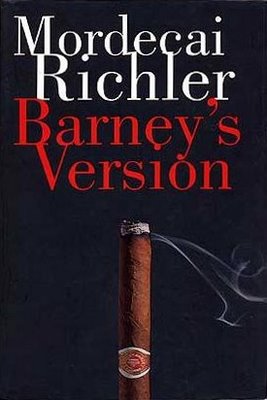 Barney’s Version accomplishes a feat that most Canadian literature can’t: it transcends its genre and stands on its own as an enjoyable read.
Barney’s Version accomplishes a feat that most Canadian literature can’t: it transcends its genre and stands on its own as an enjoyable read.
It’s a rare trick for a Canadian author, but Mordecai Richler is one of the greats. Barney’s Version is an enthralling and entertaining book that sheds so many of the conventions that other Canadian authors seem to love.
Don’t get me wrong. I enjoy CanLit. As a Canadian Studies major in my undergraduate years at the University of Toronto I’ve read my fair share of Canadian fiction. Probably your fair share too. But what should simply be a geographic category has built up an almost immobilizing amount of clichés that detracts from what should be a vibrant literary scene.
Seriously, most CanLit should come with a check list. Small, rural town with a main street of boarded up store fronts. A dark family secret, preferably involving sexual deviancy. Backhanded compliments towards the British and Americans that have a hint of jealousy. Rueful musings about life and history throughout the story.
Sometimes these characteristics are handled with aplomb, like Robertson Davies’ Fifth Business, but more often than not they create a kind of narrative rust that slows the plots of a lot of Canadian fiction.
However, Richler’s Bildungsroman/murder mystery/pseudo memoir as told by Barney Panofsky – and annotated by his son Michael – eschews most of these conventions. It even mocks them in the form of Terry McIvor, the elder Panofsky’s nemesis.
This self-awareness makes this the best book of Richler’s career.
Barney’s Version is set in 1995, as Quebec is preparing for its referendum on sovereignty. Barney, the main narrator, is coming to grips with the disappearance of the Montreal he knew and loved as well as his own personal decline as his body and memory begin to fail him.
The memoir is both a reaction to the unravelling of the world around him as well as a response to the sharp criticisms in McIvor’s autobiography and a final attempt at clearing his name in the disappearance – and probable murder – of his best friend, Boogie Moscovitch.
Planted firmly in the Richlerverse, with characters from earlier novels like the Apprenticeship of Duddy Kravitz, Saint Urbain’s Horseman and Solomon Gursky Was Here appearing throughout, Barney’s Version is Richler’s masterpiece of narrative storytelling and character development.
What’s most impressive is that the book is incredibly clever without ever getting showy or cute. Richler’s sharp use of an unreliable narrator – arguably two depending on how much faith you want to place in Michael Panofsky’s footnotes – is sharp and really stretches out the murder mystery until the very last page of the book.
Barney’s Version is well worth checking out, whether you’re familiar with CanLit or not. It is Mordecai Richler at the top of his game, pushing the narrative envelope while breaking new ground for a Canadian author, making him a singular literary figure in Canadian culture.

Unfortunately, I could not find an image that combined books and mixed martial arts. You really don't want to Google Image search that either.
In the grand spirit of Twitter’s Follow Friday I figured I’d shed some light on three blogs maintained by close friends.
The Can-Lit Project
Written by my girlfriend Katy and her sister Tory, the Can-Lit project is a series of book reviews and essays about Canadian literature.
It all began when Katy decided that she wasn’t familiar with the Canadian canon, so she and her sister dedicated themselves to reading as many books from this great country of ours as is possible. The result has been intriguing, with both of them exploring classics of the genre as well as some titles that are less popular.
In their eight months of blogging they've put up 43 reviews of Canadian books. Most are fiction, but some are non-fiction.
This may be the Canadian studies graduate in me, but I think this is a very worthy pursuit. In particular, I’ve enjoyed the debates over titles like Life of Pi by Yann Martel. I’ve never read the novel myself, but I miss this kind of heated discussion from undergrad and it makes me want to read the book so I can weigh in as well.
If anything, this blog shames me into being better read and also reading more high quality books. One of my favourite blogs to read and not just for obvious personal reasons.
The Writer’s Pet
Speaking of debates from undergrad, my friend Lija also maintains a literary blog called the Writer’s Pet. Although we used to talk about CanLit in our glory days at the University of Toronto, she’s now moved on to sunny London, England where she continues to toil in the writing game.
Her blog and Twitter feed revolve around literary news and reviews and she occasionally posts interviews with authors like Gavin James Bower, Anna Lawrence Pietroni or Marina Endicott.
It’s a great website to check in on regularly since Lija always has something interesting going on, whether it be a new review or a discussion on unorthodox bookmarks.
Victor Bachmann
My girlfriend’s brother-in-law (the husband of Tory, co-writer of the Can-Lit Project), is a professional mixed martial artist who fights out of Edmonton. He recently started a blog to record his planning and training for a tournament at the end of April that will feature fighters from across Canada in an elimination tournament, much like the original Ultimate Fighting Championship.
There’s only a few posts so far, but that handful has been enlightening. Victor’s talked about his entrance into the sport, his experience fighting at The Fight Club 10: High Octane and coming up with a strategy for his next bout.
It’s a good read for anyone interested in seeing what it takes to be a high-calibre professional athlete or for any fans of MMA.

